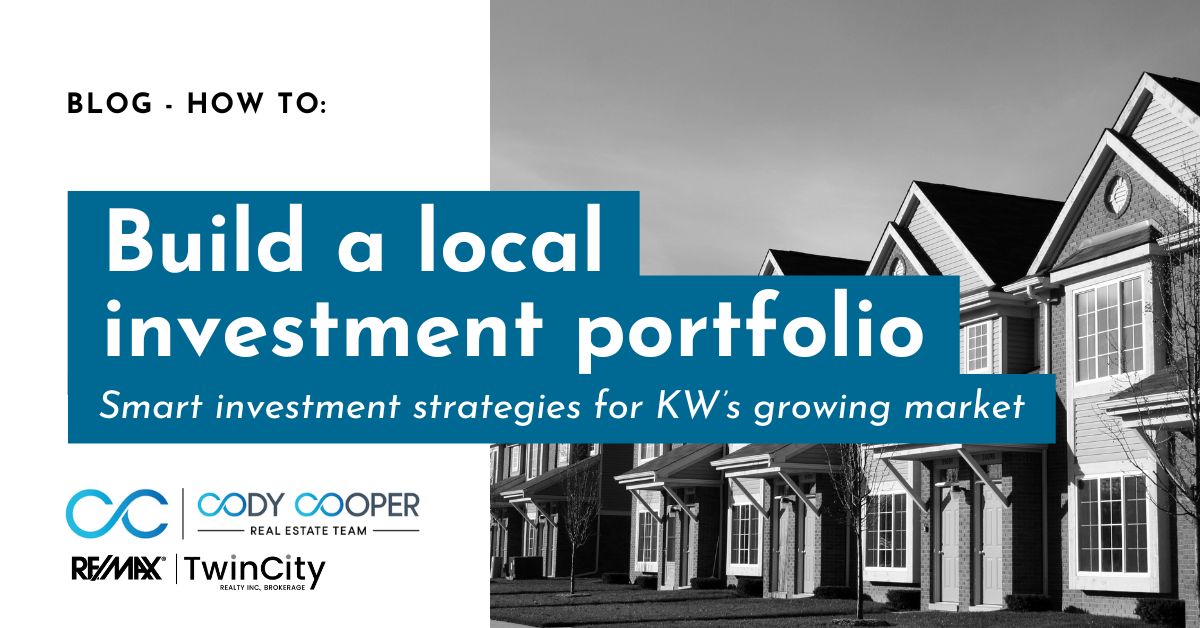Real estate investing isn’t just for big cities like Toronto or Vancouver. Kitchener-Waterloo has become a standout destination for local investors looking to grow long-term wealth. With two major universities, a college, a thriving tech sector, and a rapidly growing population, Waterloo Region offers plenty of opportunity to start and scale a real estate investment portfolio right here at home.
Whether you’re just getting started or looking to expand, here’s how you can strategically build your real estate investment portfolio in Kitchener-Waterloo.
1. Start Small with a Duplex or Legal Basement Apartment
One of the most accessible ways to get started is by house hacking. Buying a duplex, triplex, or single-family home with a legal secondary suite, allowing you to live in one unit while renting out the other(s), helps offset your mortgage and build equity.
Local Example:
In neighbourhoods like Stanley Park or Forest Hill, investors have found success with bungalows that already have, or can be converted into, legal basement suites. These areas offer quiet streets, good schools, and steady tenant demand.
Pro tip: Look for properties close to LRT stations or public transit routes, which tend to attract long-term renters.
2. Target Student Rentals Near Universities
Kitchener-Waterloo is home to Wilfrid Laurier University, the University of Waterloo, and Conestoga College campuses. This creates steady demand for student housing year-round.
Local Example:
Properties in Northdale or around Columbia Street are prime student rental zones. Investors often purchase detached homes and convert them into multi-bedroom student rentals, sometimes with five or more rooms per property.
Just be sure to follow city zoning and licensing requirements. Waterloo, in particular, has a rental licensing program that governs student accommodations.
3. Add Value Through Renovations
Flipping isn’t just about buying low and selling high; it’s about identifying properties that can benefit from strategic updates. Cosmetic renovations like flooring, kitchens, or energy-efficient upgrades can significantly increase a property’s value and rental income.
Local Example:
Properites that haven’t been updated, for example a semi-detached home in Downtown Kitchener could benefit from a modest renovation and reconfiguration of its floor plan into two units. The buyer could then refinanced and reinvested in a second property.
4. Consider Purpose-Built Rentals or Small Multiplexes
As your portfolio grows, consider moving into small multi-residential buildings or purpose-built duplexes. These offer better economies of scale and consistent cash flow.
Local Example:
In the Idlewood or Lakeshore North areas, newer duplexes with separate utilities and private entrances are often attractive to young professionals and families. These properties typically see low vacancy rates and higher-quality tenants.
5. Work With Local Professionals
Building a real estate portfolio requires a strong team. Work with a local REALTOR® who understands investment strategy, a mortgage broker familiar with rental financing, and a property manager if you plan to scale.
You’ll also want to stay on top of Kitchener-Waterloo’s zoning updates, vacancy trends, and development plans, especially with major growth around the LRT corridor and upcoming projects like the Innovation District.
Building a real estate investment portfolio in Kitchener-Waterloo doesn’t require millions of dollars or decades of experience. With careful planning, local knowledge, and a long-term mindset, you can turn one property into a foundation for financial freedom.
Want help identifying the right investment property? Our team specializes in guiding local buyers through smart real estate investments tailored to Kitchener-Waterloo’s unique market. Contact us today!






















